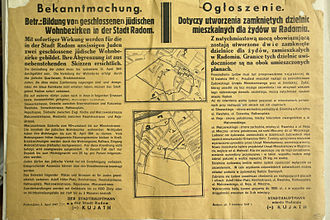Hans Kujath
Hans Kujath (born April 9, 1907 in Ottoburg in Hinterpommern (today Bezmoście in the West Pomeranian Voivodeship ); † October 22, 1963 in Donauwörth ) was a German lawyer and National Socialist . In German-occupied Poland Kujath served as county and city captain operates.
Life
Kujath, son of a landlord, finished his school career in 1926 with the Abitur . Kujath then completed a law degree at the universities of Freiburg , Bonn , Berlin and, most recently, Königsberg , which he graduated with the first state examination at the end of January 1932. Kujath had to interrupt his legal traineeship twice for lack of money before taking the second state examination. Kujath previously worked for several months at the city administration in Eberswalde for several months and worked as a lawyer after the assessor exam in 1936.
The Nazi Party he joined in November 1932 ( membership number 1362040) and became a member of the later SS (SS no. 432143). With the SS, Kujath reached the rank of SS-Hauptsturmführer in August 1941 . Kujath also worked as a department group leader for Kurmark and Berlin .
After the outbreak of World War II , Kujath was accepted into the administration of the General Government. There he initially headed the asset management department in the Radom district and from January 1940 the internal administration department, district governor was Karl Lasch . In June 1940 Kujath became mayor of Radom . In August 1941 he moved to the district of Galicia and worked there as city governor of Lemberg before he was replaced by Egon Höller in February 1942 in this position. Shortly after taking office as Lviv city governor, Kujath had Jewish workers recover the bodies of the NKVD victims from the Lviv detention centers. Kujath was involved in the establishment of the ghetto in Radom and Lemberg.
On April 20, 1942, Kujath succeeded Gerhard Littschwager Kreishauptmann from Czortków and worked there until February 1944. In April 1943, the Higher SS and Police Leader in the Generalgouvernement Friedrich-Wilhelm Krüger applied for Kujath, Höller and Nehring to be transferred to the Waffen-SS because he missed the correct SS attitude with them. However, this request was rejected by the head of the SS main office Gottlob Berger . At the end of September 1944, Kujath was drafted into the Waffen-SS and was taken prisoner of war in May 1945, from which he was released in August 1947. Arbitration proceedings initiated against him were closed in Bielefeld at the end of February 1950 . Kujath was denazified on March 25, 1952 as a fellow traveler . Kujath then worked as a lawyer. A preliminary investigation initiated against Kujath was stopped by the Hamburg public prosecutor's office after his death .
literature
- Thomas Sandkühler: Final solution in Galicia. The murder of Jews in Eastern Poland and the rescue initiatives of Berthold Beitz 1941–1944 . Dietz successor, Bonn 1996, ISBN 3-8012-5022-9 .
- Dieter Pohl : National Socialist Persecution of Jews in East Galicia, 1941–1944. Oldenbourg, Munich 1997, ISBN 3-486-56233-9 .
- Markus Roth: Gentlemen. The German District Chiefs in Occupied Poland - Career Paths, Rule Practice and Post-History. Wallstein Verlag, Göttingen 2009. ISBN 978-3-8353-0477-2 .
Individual evidence
- ↑ a b c d e Thomas sand cooler: Final solution in Galicia. The murder of Jews in Eastern Poland and the rescue initiatives of Berthold Beitz 1941–1944 . Bonn 1996, p. 454f.
- ↑ a b c d Short biography from Markus Roth: Herrenmenschen , Göttingen 2009, p. 486.
- ↑ Dieter Pohl: National Socialist Persecution of Jews in East Galicia, 1941–1944. Munich 1997, p. 133.
- ↑ Dieter Pohl: National Socialist Persecution of Jews in East Galicia, 1941–1944. Munich 1997, p. 158.
| personal data | |
|---|---|
| SURNAME | Kujath, Hans |
| BRIEF DESCRIPTION | German lawyer and National Socialist |
| DATE OF BIRTH | April 9, 1907 |
| PLACE OF BIRTH | Ottoburg |
| DATE OF DEATH | October 22, 1963 |
| Place of death | Donauwörth |
